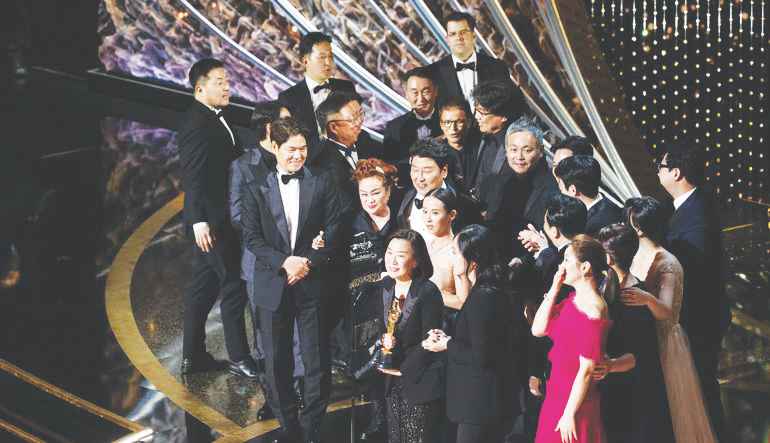
In the late hours of Feb. 9, the Academy of Motion Pictures and Sciences hosted the 92nd Academy Awards, more commonly known as the Oscars. As usual, the nominated stars donned glamorous looks for the night and announcers interviewed various nominees on the red carpet. However, as soon as the lights dimmed in the Dolby Theater, everyone’s eyes — at home and in the venue — zeroed in on the theater stage.
Much debate surrounded the nominees for the Best Supporting awards. Well-known faces and shining newcomers held nominations in these categories, which made predicting the winners difficult. Florence Pugh, a relative newcomer, seemed like critics’ favorite to win with her compelling performance as Amy March in
Little Women
. Yet others argued that well-established names in Hollywood provided significant competition.
Kathy Bates shone as protective mother Bobi Jewell in
Richard Jewell
, while Scarlett Johansson drew audiences in as the enigmatic Rosie Betzler in
Jojo Rabbit
. Margot Robbie’s multifaceted performance as Kayla Pospisil in
Bombshell
also received critical nods. In the end, the Academy chose an old favorite, awarding Laura Dern the Oscar for her cutthroat performance as Nora Fanshaw in
Marriage Story
.
While the Best Supporting Actor category consisted of only familiar faces, each actor gave a strong performance that made the category competitive and difficult to predict. Anthony Hopkins, a name recognized by critical and public audiences alike, received a nomination for his complex role as Pope Benedict XVI in
The Two Popes
. Additionally, both Al Pacino and Joe Pesci delivered gripping performances as intimidating mob bosses Jimmy Hoffa and Russell Bufalino in
The Irishman
, while Tom Hanks charmed everyone with his tender portrayal of Fred Rogers in
A Beautiful Day in the Neighborhood
. The award was ultimately snagged by Brad Pitt for his portrayal of the rugged stunt double Cliff Booth in
Once Upon a Time…in Hollywood
.
Meanwhile, the craft categories had a more homogenous view of their winners. Period pieces dominated these accolades, especially
1917
, which took home three artisanal Oscars, including a surprising defeat of CGI-heavy blockbusters
Avengers: Endgame
and
Star Wars: The Rise of Skywalker
in Best Visual Effects. In contrast,
1917
winning for Best Cinematography and Best Sound Mixing shocked no one, as critics have consistently praised these elements in their reviews of the movie. However, the competition was still stiff, as
1917
competed against films that delivered incredible sound and cinematography, like
Ford v. Ferrari
and
The Lighthouse
.
Once Upon a Time…in Hollywood
continued the wins for period pieces, winning Best Production Design, while
Little Women
took home Best Costume Design. The musical awards also favored period dramas, recognizing Hildur Guðnadóttir’s unnerving score for
Joker
and Elton John and Bernie Taupin’s catchy
Rocketman
anthem “(I’m Gonna) Love Me Again” for Best Original Score and Best Original Song respectively.
The Academy supported period dramas in Best Acting as well, but unlike the nominees for Best Supporting, the Academy featured only well-established faces in these categories. The nominees for Best Actress made up a talented list, including Cynthia Erivo as Harriet Tubman for
Harriet
and Saoirse Ronan as Jo March for
Little Women
. Some critics predicted that Scarlett Johansson, as Nicole Barber in
Marriage Story,
or Charlize Theron, as Megyn Kelly in
Bombshell,
would win, but the Academy gave the Oscar to Reneé Zellweger, rewarding her heartbreaking performance as the legendary Judy Garland in
Judy
.
Many also predicted that Oscar newcomer Adam Driver would take home the award for his portrayal of the volatile Charlie Barber in
Marriage Story
. However, he faced acting tours-de-force such as Leonardo Dicaprio as the complex Rick Dalton in
Once Upon a Time
and Jonathan Pryce as Pope Francis in
The Two Popes
. Antonio Banderas also garnered praise for his emotional performance in
Pain and Glory
, but the Best Actor Oscar ultimately went to Joaquin Phoenix, whose alarming portrayal of Arthur Fleck in
Joker
gained massive acclaim.
Despite multiple unsurprising wins, the Oscars were also full of surprises. Though some might claim that they correctly predicted
Toy Story 4
to win Best Animated Feature, as the Academy tends to favor Disney works, many others expected either
Klaus
or
I Lost My Body
to claim the award, as both movies featured compelling animated narratives that stirred the emotional heartstrings of numerous audiences.
Similarly,
American Factory
won Best Documentary Feature despite how critics lauded
Honeyland
and
For Sama
for exposing compelling stories to the public. Best Adapted Screenplay, which was awarded to
Jojo Rabbit
, surprised some viewers for its strikingly satirical storyline that beat out the kind of familiar dramatic narratives — like
Little Women
and
The Two Popes
— that the Oscars tend to praise.
However, the greatest shocks came with
Parasite
, possibly the most talked-about movie of 2019. Its win for Best Original Screenplay and International Feature felt given, as public and critical audiences across the globe have been talking about it for months. But the Academy surprised both Hollywood stars and home viewers when the Oscar for Best Director went to Bong Joon-ho, director of
Parasite
. Though well-known in Korea, Bong was new to the Western awards scene, so his win over Western cinema veterans like Martin Scorsese and Quentin Tarantino astonished many. And saving the most astounding for last, the Academy awarded the Best Picture Oscar to
Parasite
, making it the first non-English film to win that category.
Despite the winners and snubs already being debated on various social media sites, this year’s Oscars undoubtedly were an entertaining watch for an audience of both movie lovers and casual award show watchers.

























